
The War of Words
In this Adventures in Odyssey drama, a carelessly uttered word from Eugene creates havoc as it becomes the fashionable insult, resulting in a lesson about the power of words.
Home » Episodes » Focus on the Family Broadcast » A Mother’s Story of Loss and Redemption
Excerpt:
Lindsey Dennis: I didn’t understand – God, how do I hope in you, when I am so disappointed? You say there is this hope that doesn’t disappoint, so what does that mean? Because I am so disappointed.
End of Excerpt
John Fuller: You know, few parents have had to experience the heartbreak of losing a child and even fewer still have to go through that challenge twice. Lindsey Dennis endured the tragic loss of two – the tragic loss of two of her children shortly after they were born. And today you’re going to hear the story of how God worked in her life to begin to give her hope again. Your host is Focus president and author Jim Daly. And I’m John Fuller.
Jim Daly: John, the truth of this life is there is tragedy, and there’s tragic circumstances that no one can fully prepare for that you can’t avoid. It happens. And we’ve got to, as faith-oriented people, Jesus followers, we’ve got to figure out – what does that mean? How does God relate to us and, more importantly, how do we relate to God when those things happen? Lindsey Dennis had to grieve the loss of her two children only hours after they were born, like you said John. And she’ll offer you hope and encouragement today, as we explore that journey for her and her husband. She’s written an excellent book that I want to recommend. It’s called Buried Dreams: From Devastating Loss To Unimaginable Hope. And Lindsey, let me welcome you to “Focus on the Family.”
Lindsey: Thanks for having me. It’s so great to be here.
Jim: I see a smile on your face.
Lindsey: Yeah.
Jim: So I think that should say to the listeners that you’re in a good place.
Lindsey: Hm.
Jim: But, we need to paint the picture and hear that emotion from you, what that was like. You and your husband Kevin, no doubt excited to start a family not long after you married. That’s what we all do as couples, right? We start – OK, we got the marriage part down. Now let’s – at some point along that journey, where do children come into this, et cetera. And you got pregnant right away. Take the story on from there. What happened and were you excited and making all the plans?
Lindsey: Yeah. I mean, I was 33. My husband was 34. So we knew that it might not be easy to become pregnant. So when we became pregnant six months into marriage, we were so excited.
Jim: Yeah.
Lindsey: And couldn’t believe it. And we’re planning and preparing and just imagining what life would be like with this little new baby that was about to enter our family. And so, I was nervous, as I think most new pregnant women are nervous, those first 12 weeks, and I knew there wasn’t guarantees. And then after 12 weeks passed, I – we started to tell more and more people. And we were just confident in the journey that we would be having and…
Jim: Everything at that point felt normal.
Lindsey: Yeah, everything felt normal.
Jim: Yeah.
Lindsey: I mean, I – you know, there’s little things that – is this wrong? Is this wrong?
Jim: Right.
Lindsey: And little paranoia points. And so, we went into our 20-week ultrasound, and the only thing that I was concerned about was, I hope that the stenographer does not tell us the gender, because we wanted to be surprised. So that was, like, my biggest concern. And I knew that things could go wrong, but I think in the back of my head I just didn’t think it would go wrong for us. Um…
Jim: Right, it’s always gonna happen to somebody else.
Lindsey: Yeah, not us.
Jim: And that’s understandable. But, you met with the doctor. What did they say?
Lindsey: So, we were sitting there, and the doctor – the stenographer left for a very long time. And both of us were nervous, didn’t say anything. And then our doctor came back into the room and held my hand, and she said, “It’s not good. We can’t seem to find the skull of your baby. And so, we’re gonna send you to a high-risk doctor to confirm.” And we didn’t know what – I was just swirling all of these thoughts. And it just felt like almost an out-of-body experience, that – wait a second – we were going down one path with this child, and now we don’t even know what it means that our baby’s skull has not formed. And can they live? Is this curable? She may have said other things; I didn’t remember at all.
Jim: Yeah.
Lindsey: So, my husband and I quickly went to a high-risk doctor, and he confirmed that our baby had what was called anencephaly. And it’s where their brain and skull had not formed. And there was no cure, and it was fatal, and our baby would not live once born. Maybe they would have minutes, and – but there is nothing we would be able to do after that.
Jim: At that point you had to make a really hard decision, too, and that was do I continue and have this baby, or do we do something else? Do we abort this child? Speak to that issue because there are going to be moms now maybe facing something like that. How did you and your husband process that?
Lindsey: You know, in that moment I was looking at my little baby on the screen, and we found out it was a little girl. (EMOTION) And this was my daughter that I had longed for.
Jim: Yeah.
Lindsey: And so we find out that she won’t be able to live, and my first thought was – I knew they were – I knew they were gonna give me options. And my first thought was, we will carry her. I will carry her. And I will celebrate every moment of life God gives her to me. And so Kevin and I didn’t even talk about it. I knew that he was on the same page as me. And so as soon as the doctor told us our options, we said, “No, we will carry her.” And he said we had a certain amount of time to decide. And I don’t know at that moment if he thought maybe we were just in shock.
Jim: Right.
Lindsey: But we were steadfast, and we knew this life was precious, and we knew that God had given this little girl to us for a season. We didn’t understand why. We were filled with sorrow and sadness and not knowing how we would go on this journey, never knowing anyone who had walked this journey before. But we knew that this life was – needed to be valued.
Jim: Yeah.
Lindsey: And we wanted to value her.
Jim: Lindsey, again, to help those who are struggling maybe with something very similar, maybe with some things not so similar, but it’s still grief. The benefit of doing that, I mean, for that pregnant mom that’s listening who may have gotten a really bad diagnosis, why were you so resolute? What benefit did you have, emotionally, spiritually, from going through the process, even though you knew what the end result was going to be?
Lindsey: You know, I don’t think that at the time I did it for the benefit of me. I think that I did it because I knew that this life was valuable, and that somehow God was in this story even though I didn’t understand it, and that he was for me, and he was for my husband, and he was for this little life, and I could trust Him with that. And I think sometimes we hear bad news, or we imagine how hard a situation could be – and maybe that’s all that people tell us is how hard it will be – that we leave out that there can actually be joy in that journey, that there can actually be something that would happen that would cause our hearts to know joy and hope mixed in with the sorrow. I think we just imagine loss. And I was just imagining loss. But also in the back of my head, I knew God, you are in this story, so you’re gonna do something that maybe I can’t see and maybe I’ll never see, and that’s what he began to do, is…
Jim: Yeah.
Lindsey: …is infuse joy where there should not have been joy.
Jim: That is what the Lord does in all situations, isn’t it?
Lindsey: Mmm hmm.
Jim: I mean, that’s what’s so beautiful about the love of God. I mean, it’s there and present. We just have to open our hearts up to it.
Lindsey: Yeah.
Jim: And – but that moment came. You gave birth. You held little Sophie. Describe that – even that – you knew that she would only live a very little while. How did you and your husband respond to that? Was it a special time or was it just all grief?
Lindsey: Well, we – throughout the course of our journey, a community of hundreds of people gathered around us and then online thousands of people gathered around us to celebrate this life. And so, there was people kind of waiting in anticipation for her birth. And at the hospital, our friends from our church had – I mean, 30 or 40 of them were at the hospital waiting and praying and were there for the whole time that I was in labor. And so, our family was – had all come into town, and they were there just – we wanted to celebrate this life. And so, we were hopeful that she would be born alive. That was our prayer, that she’d be born alive. We didn’t know if she would be. And I remember – I ended up having to have a C-section. And I remember when she – when I saw her for the first time, and I had fallen in love with her in my womb. But, when I saw her for the first time, it was like this explosion of love for her that I had not experienced before.
Jim: Yeah.
Lindsey: And I saw that she was broken. I saw that God had not healed her. I knew that she would not be with us for long. And yet I loved her so deeply in that moment. And you would have thought, in the next 10 hours of her life, that – that she was just like any other newborn. We knew that she was gonna pass away, and yet God just gave us the ability to enjoy and be present in the moments of her life. And we filled the hospital room with, like, to capacity and beyond, with a birthday cake and people singing Happy Birthday and just gathering around us to hold her and love her and celebrate her life. And so, those moments in the hospital, they were – there were many tears, but there was so much joy in just her being alive.
Jim: What a difference. I mean, that’s what your faith in Christ brought to you at that moment, wasn’t it? You and your husband…
Lindsey: He gave us a peace, yeah.
Jim: …That you could joy in this whole difficult situation.
Lindsey: It was – it was amazing.
Jim: And it’s so powerful. That demonstrates such an amazing faith in Christ and for eternal life, what’s to come. That’s what I love. Because I believe personally you’ll see your daughter again.
Lindsey: Yes, I believe that – confident. Yeah.
Jim: And it’s not the – it’s not – this is not the end.
Lindsey: Yeah.
Jim: I feel sorry for people that don’t have faith, because they – it’s got to be a very troubling thing.
Lindsey: It’s very hopeless.
Jim: I mean, it’s hard when you are a person of faith to have hope in that – in devastating circumstances. But to be able to cling to the idea that I will see my child again. Man, that’s good.
Lindsey: Yeah.
Jim: Now, you and your husband, you move through life, things continue. I’m sure you’re doing the normal things in life. And now you have to have that discussion together. And I don’t want to pry too personally, but are we gonna try again?
Lindsey: Mmm hmm.
Jim: How did that go? And the answer was yes. Describe what took place.
Lindsey: Well, we – as far as we knew, this condition that our daughter had was an anomaly, and we didn’t carry any of the risks associated with potential genetic connections, which there’s not much research done on it, and not much is known as to why it occurs. And we were taking precautions to ensure that, in the neural tube defect category, that I would not – that if we did get pregnant again, that that would not happen again, based on different things I was taking medically.
Jim: Yeah. Move us through the story, so I can ask those tough questions, because people need to hear what happened. I mean, you got pregnant a second time.
Lindsey: Um-huh.
Jim: Move us through what happened.
Lindsey: Yeah. So, I was nervous to celebrate this life. I was nervous. You know, will we find out this baby has a similar condition or something different? Now we were in a whole world of infant loss, and we knew a lot of things that could happen.
Jim: And I’m sure, from a doctor’s perspective, you were in a high-risk category.
Lindsey: Yes, yeah.
Jim: So they were watching more intently than they would normally.
Lindsey: Yes. And they had grown to love us, and we had grown to love them, so we were at the office often. And so we knew that we were able at this point to find out at 12 weeks pregnant whether or not our baby had this condition. So we went in and we were, again, hopeful, but also we just wanted to know. And we went into the office, and our stenographer who had been with us throughout Sophie’s journey, she became very silent and printed off a photo and gave it to us. And we were just trying to, like, figure out, like, can we see the brain and skull? It looks a little different. And they – she was gone for what felt like an eternity. And our doctor came in, and he held my hand, and he said, “It’s not anencephaly. It’s called acrania. And it’s where the brain has formed, but the skull has not, and it will play out the exact same way.”
And in that moment, where… where when we found out about Sophie, it seemed as if God’s peace and his presence was just throughout that entire room. In that place, it felt very dark. And as if – I felt as if God had abandoned us. He didn’t – he wasn’t working in the way that I thought he would. How could he ask us to walk us – this journey again? And now I knew what it was like to lose a child. I knew what it was like to say goodbye. I knew it was like to bury a baby. And I looked ahead and thought – “How am I going to do that again? How am I gonna walk through this again?” – knowing that God would sustain me, but the same breath feeling as though I do not have the resources to be able to do this. I was still grieving my – the loss of my first daughter, and now I was in another pregnancy and having to even press that grief on pause in a way to anticipate the loss and – of my second daughter but also wanting to celebrate and honor her life, as well.
Jim: Overwhelming.
Lindsey: Um-hm.
John: Yeah, grief upon grief.
Lindsey: Yep.
John: Where do you turn when God says, “I have a very hard road for you to walk?” This is Focus on the Family with Jim Daly. I’m John Fuller. And we’re talking today with Lindsey Dennis, the tragic loss of two children. And, the book is called Buried Dreams: From Devastating Loss To Unimaginable Hope. We’ve got the book, a lot of other resources. And you need to know we have caring Christian counselors here as well. If you’re struggling, if you don’t know where to turn, give us a call – 800, the letter A, and the word FAMILY. Or online we’re at focusonthefamily.com/broadcast.
Jim: Lindsey, on behalf of the listener, I mean, you’ve shared this gripping story. I’m sure some are saying, “How could you wake up? How could you put your left foot in front of your right foot?” This is devastating. Especially, I think, to a mom who wants to be a mom. You’ve got to tell us where any ounce of strength came from. How did you not fall into depression? How did you not fall into anguish? Or, were you there, and how did he pull you up?
Lindsey: My – our journey with Dasah was very different than our journey with Sophie, for me, emotionally. And I did fall into places of depression and anguish and just deep pain and deep questions for God. Questions I didn’t have as we walked through the loss of our first daughter began to surface. And I was…
Jim: Could you give us an example, if it’s OK?
Lindsey: Like – yeah. Like, God, are you good? Like, are – is this your goodness? God, do you see me? Do you see the desires of my heart? Are you a kind God? At the time my best friend was also pregnant, and my sister was pregnant. And they – and I thought, this will be the journey that I get to be pregnant with them, my closest friends, and we get to have children together. And then, I was the one that was going to lose another child. And so, I wrestled with God’s kindness to me in that. It didn’t feel kind. And I didn’t understand – God, how do I hope in you, when I am so disappointed? You say there is this hope that doesn’t disappoint, so what does that mean? Because I am so disappointed.
Jim: Yeah.
Lindsey: And, I think that God began to meet me in the dark places of my heart and surface these things, these aspects of – of how I viewed Him that were actually not true. And I thought that walking with Him or His goodness meant that my life would kind of go at least a little bit how I thought it would go. So, how do I trust you when it feels like it’s all kind of ripped to shreds, in a way? And I had to go to His Word, and I had to have a body of believers surround me.
Jim: Yeah.
Lindsey: And remind me of things that I would easily forget.
Jim: Well, and in that context, you know, the word is pretty clear that you don’t trust in your circumstances. I think people who don’t have a relationship with God will say that you’re ignoring the pain in front of you, right?
Lindsey: Mmm hmm.
Jim: But what – how do we, in a rightful, healthy, appropriate way, how did you manage that through, to say, “OK, Lord, these tragic things have happened to me and my husband, but I’m not going to trust my circumstances. Your Word says this, and I’m going to choose to believe what you say versus what I’m experiencing. And how is that right and not inappropriate, or a falsehood?”
Lindsey: Mm-hm. Uh, it really wasn’t until after Dasah was born and passed away that I began a significant season of really learning what it meant to lament and connecting to the Psalms, connecting to Lamentations, to the book of Job, to understanding what does it mean to bring my pain to God, that He can handle my pain, that He actually wants to meet me in my pain. And these were places – and even as I was pregnant with Dasah, these are places where I began to understand what He did for me on the cross, what it meant that He bore the weight of my pain and sorrow and the sin in this world.
I mean, when I – when I could taste this anguish that, honestly, I didn’t think it could feel worse than losing my first daughter. I didn’t think I could go to a deeper place of sadness. And then I did. And I was feeling things that I had never felt through my journey of grief with Sophie. And I began to think of how Jesus bore the weight of not just my pain and sorrow in this life, but of everyone, and what heaviness that must have felt like and what love that He would choose to engage in our hearts and care for us in such a way that He would take on our pain. And it moved me to the cross in a way that I hadn’t been moved to the cross before.
That every time I started questioning His love for me, He kept bringing the cross back to me. Like, Lindsey, how could I love you any less – or any more than that day on Calvary?
Jim: Huh.
Lindsey: And I had to go back to the cross. And I didn’t always go back very quickly. I wanted it to look a certain way. I wanted His love to mean X, Y and Z. I wanted His goodness to me to mean He’s gonna heal this baby, He’s gonna provide in the way that I want Him to provide. But I went back to the cross, and I just began to understand in deeper ways. God, will I – am I gonna trust You in this life that
You’re for me, and that you are writing something, a bigger story than what I can even imagine, that I play just a small part in. I can’t see the fullness of how You’re gonna redeem and how you want to redeem the pain in this life.
Jim: Yeah. And what you’re describing, Lindsey, is faith.
Lindsey: Um-hm.
Jim: You know, so many nonbelievers that I’ve encountered, they say with some anguish, “I’m envious of you, because you can have faith in something you can’t see. I can’t do that.” It’s such a discouraging comment when I hear that because, as a believer, we’re saying, “No, just do this.” And then they – kind of that mind that can’t get beyond what’s tangible, what’s real, what’s material.
Lindsey: Well, I hear – yeah.
Jim: They can’t take that step.
Lindsey: Yeah. And I hear – and I hear it from believers, too. I heard so many people tell me, “I wouldn’t have the same faith as you. And I just would – it’d break my heart because I would – I saw my weakness and how I struggled.” And it’s like, yes, you would because you serve the same God I do, and he’s the one who sustains, and his word is powerful. Even when I open it and it feels dry and flat and void of power, that does not mean it’s not powerful and not doing a work in my heart.
Jim: Yeah.
Lindsey: And, you know, I would look across from my friends who would say this to me, and I would say, “You would have the same faith because it’s the object of your faith that gives you strength. It’s not your ability to muster up this courage.” I mean, I felt like I was at my weakest in that season, and yet God just came out of me…
Jim: Yeah.
Lindsey: …In a way that I – that I can’t believe, to be honest.
Jim: Yeah. Well, and it’s so hard to put into words. Let me ask you in this regard because, you know, people listening will have different components of your story. They may have lost a child through miscarriage or something like that or something totally unrelated to children. Or they have that prodigal child. It’s as if they, you know, have no relationship, as if their child is dead. How did you and your husband stay connected? How did – ’cause this is a moment that is very volatile in marriage. What happened between the two of you?
Lindsey: Well, again, our journeys were very different both times. With Sophie, it brought us really close together. And I felt like we were in our grief together. And then, as we walked through our journey with Dasah, our reserves were just depleted. And our ability – I mean, I was just trying to survive.
Jim: You’re like Job.
Lindsey: Yeah. And I…
Jim: I mean, you were there.
Lindsey: Yeah. And I was just trying to, you know, be pregnant, knowing I was gonna lose this child. And so, I didn’t have the resources and energy to engage well with my husband and his grief as well. And so, we had to learn to communicate in new ways. We had to gather resources around us to help us to – in places we were stuck in our grief. And, also, I had to learn that it was OK that he grieved differently than me, and that that did not invalidate his grief, that just because he was grieving differently didn’t mean that he wasn’t grieving.
Jim: Well, that’s the point…
Lindsey: Yeah.
Jim: …I was going to say. Men, we tend to compartmentalize. It’s God’s wiring in our brain. That’s why we can go to battle and never talk about it for the next 50 years. We just put it in a place, and we keep going. Did your husband have that kind of experience, like, you couldn’t see?
Lindsey: No, not really. I think that some of it was simply I – my grief was different, because I was carrying my daughter.
Jim: Yeah.
Lindsey: So there was this extra component of loss that I was experiencing.
Jim: Connection.
Lindsey: And connection. And then his grief just played out differently. I was the one that cried and had the tears. I mean, he had tears, too. But, as time went on, his turned more to control, or – yeah, just trying to control things, probably. And…
Jim: I would – I can identify with that.
Lindsey: So, it would play out very differently in our marriage and in our conversation about grief.
Jim: But, the point is, you held it together, and you guys are doing great. We only have a couple of minutes, and I do wanna talk about that hope that you mention in your book. So, you went on to adopt your third child.
Lindsey: Mmm hmm.
Jim: And you did have a fourth child.
Lindsey: Yes.
Jim: And, describe that. I see the smile from ear to ear.
Lindsey: She’ll be 1 next week, so I can’t believe that.
Jim: (Laughter) One next week?
Lindsey: Yeah.
Jim: So that’s fairly new.
Lindsey: Yeah. Yeah.
Jim: So yeah, give us that, uh, experience
Lindsey: So our son is 3, and we adopted him at birth about 14 months after Dasah passed away. We knew adoption would be in our story. Obviously, it came into our story, I think, like many families, not the way that we thought. And, yeah, we knew that – that we wanted that to be a part of our story. And so, we brought him home from the hospital, and he is a delight to our heart.
Jim: (Laughter) That’s sweet.
Lindsey: And has brought so much joy into our life.
Jim: Changed his life forever.
Lindsey: Yeah, and ours. And then we decided to take a risk and try again. There still was no reason to believe that we had a genetic issue going on. And I – I looked ahead, and I just thought, you know, if I – if we don’t try again, will I regret it?
Jim: Lindsey, some may have just gone (gasp!) – like, what?
Lindsey: Yeah.
Jim: I mean, as a woman, as a mother, you had to be filled with fear.
Lindsey: Oh, yeah. Oh, yeah.
Jim: The third time…
Lindsey: Yeah, yes.
Jim: …You were gonna try this.
Lindsey: Yeah.
Jim: I mean, someone is saying, “Why? Why would you do that?” Why?
Lindsey: I – you know, I just – I – we both sensed that God had not closed the door on this, that we wanted to, um, trust him and not make a decision out of fear.
Jim: Yeah.
Lindsey: There was, again, no reason to believe, for us, that this would happen again. And so we just decided that we would take a risk. I knew I did not regret carrying Sophie and Dasah. And I knew if it happened again, I would be devastated. But I would not regret carrying another baby. Um…
Jim: You know, women would get this. That is an incredible step of faith, as a woman, to have two children die right after being born, and then to try a third time.
Lindsey: Yeah.
Jim: That is a step of faith.
Lindsey: Yeah. I – it was the Lord who led us to that, because I think I was deeply afraid a lot of the time, and yet he gave me – he gave us courage, and we have this beautiful little girl. And to – you know…
Jim: So, it was a little girl.
Lindsey: Yeah. Her name is Briella.
Jim: Three girls…
Lindsey: Yeah.
Jim: …You had.
Lindsey: Yeah.
Jim: Yeah. Wow.
Lindsey: And Jaden, our son.
Jim: Yeah. And so talk about that moment – giving birth, your husband there, and everything was in a good place.
Lindsey: It was hugely redemptive. It was a beautiful moment of just seeing the joy and the pain – the pain of the moments of seeing Sophie and Dasah and then losing that, and then this joy of seeing Briella, it just felt like a taste of hope fulfilled. A taste of what it will be like when we see Jesus face to face, and we – we have experienced the pain in this life, and we see how He has redeemed it and the joy that will come out of gosh, God, you did it. You said you were gonna do it.
Jim: Yeah.
Lindsey: And You redeemed it.
Jim: Yeah. Lindsey, there may be people who have had two, three, four major disappointments – maybe more, who knows. They’re still in that waiting-for-a-win posture. They don’t feel like they’ve had that third child and everything’s good. What word of advice would you have for them? You’re kind of speaking to the Job story.
Lindsey: Yeah.
Jim: “It’s all gone wrong. I don’t have much hope. I’m hanging by a string.” What do you say to them?
Lindsey: You know, I would say that there is no guarantee of a win in our life for what we want.
Jim: That’s good.
Lindsey: But one thing I observed in Job’s story is he never got answers to his why, but he did get answers to his who. And then God met me in my pain. And He showed me His goodness, before Jaden even came into our life, in a way that – Jaden was just simply an added bonus. Briella has been an added bonus. But neither one of them were, like, the – neither one of them were a stake in the ground to say, “Oh, yes, I do believe God is good, because He did this.” God was doing that in my heart in the season of sorrow. And so, I would say that God is at work in the season of sorrow. He wants to meet us in our pain. There is no promise of when that pain will lift, but He – it will lift when we see him. But this side of heaven, He is at work, and He is using the sorrows of this life to draw us closer to Him in ways that – that I think only sorrow and suffering can bring us to Him.
Jim: That is so well said. And I resonate with it, believe me. Thank you for not just the book, Buried Dreams, but also your ongoing attitude, for you and your husband to be really so positive about God’s gift of life to us and how to manage it well, and not to trust in your circumstances, but to trust in the who…
Lindsey: Yeah.
Jim: …And that is God himself.
Lindsey: Yeah.
Jim: He loves you. And if you’re in a bad place, call us. Man, we are here for you. We have great Christian counselors.
We have wonderful resources, like Lindsey’s book, Buried Dreams: From Devastating Loss to Unimaginable Hope. That’s the Christian message. And just make a gift of any amount, we’ll get it to you. If you can’t afford it, we’ll get it to you; just call us.
And I think this will be a great tool to lift you up out of the clouds and into the presence of God.
John: Online you can donate and find great resources at focusonthefamily.com/broadcast.
Well, next time on this broadcast Stephen Arterburn will help you to find fulfillment and avoid a midlife crisis.
Teaser:
Stephen Arterburn: But there’s not retirement in my mind. There’s a shift. There’s a transition. And you can be preparing for that transition at age 40, 45, and it can be the greatest time of your life.
End of Teaser

Lindsey Dennis has served on the staff of Cru for 15 years, sharing the Gospel and discipling Christians in countries and on campuses around the world. She is the author of Buried Dreams: From Devastating Loss to Unimaginable Hope, which tells her painful story of losing two daughters back to back and shares the hope of Christ with others facing the loss of a child. Lindsey and her husband, Kevin, have four children, Jaden and Briella, and their daughters who have passed, Sophie and Dasah. Learn more about Lindsey, her journey, and her writings by visiting her blog, www.vaporandmist.com.
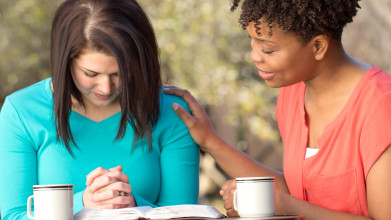
Focus on the Family offers a one-time complimentary consultation from a Christian perspective.
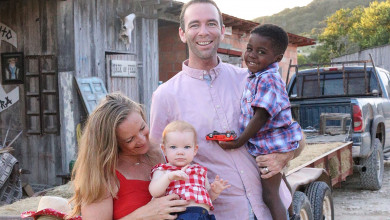
When my husband and I learned that our unborn baby would not survive outside the womb, we were devastated. Kevin and I held on to each other for dear life. We wept as one, we prayed as one and we clung to God's Word as one.

Strong feelings of sadness almost always occur following the death of a close friend or family member. But what happens when these feelings don’t subside?

Many couples struggle during critical events that create an emotional crisis. Crises can stress marriages even to the point of divorce. Here's how to draw closer even during a crisis.
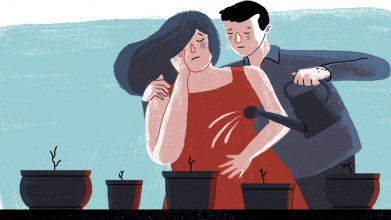
Every aspect of infertility can be a marital, spiritual and ethical challenge. What can a husband do to keep his marriage going during a season of infertility?
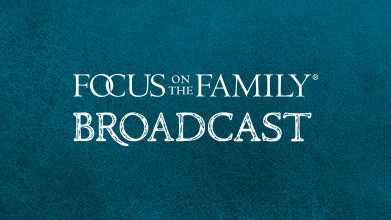
In a discussion based on his book When God's Ways Make No Sense, psychologist Dr. Larry Crabb explores the topic of suffering in both the Bible and through personal stories, and offers encouragement through the re-assurance that God cares for us and is trust-worthy, even when circumstances seem to dictate otherwise. (Part 1 of 2)

In a discussion based on his book When God's Ways Make No Sense, psychologist Dr. Larry Crabb explores the topic of suffering in both the Bible and through personal stories, and offers encouragement through the re-assurance that God cares for us and is trust-worthy, even when circumstances seem to dictate otherwise. (Part 2 of 2)
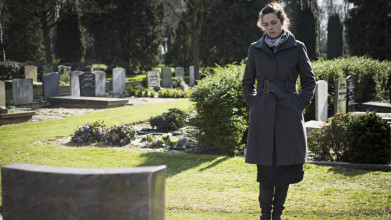
A loved one dies and the despair seems unbearable. Grieving the loss is where the healing process begins.

In this Adventures in Odyssey drama, a carelessly uttered word from Eugene creates havoc as it becomes the fashionable insult, resulting in a lesson about the power of words.

This discussion offers a preview of Volume #16 “Cultures in Conflict” from the That The World May Know video series, available below.

Debra Fileta will help couples better understand the four seasons of healthy relationships, what to expect during each one, and how to carefully navigate them for a stronger marriage. (Part 1 of 2)

Psychologist Dr. Kelly Flanagan discusses the origins of shame, the search for self-worth in all the wrong places, and the importance of extending grace to ourselves. He also explains how parents can help their kids find their own sense of self-worth, belonging and purpose.

Jonathan McKee offers parents practical advice and encouragement in a discussion based on his book If I Had a Parenting Do Over: 7 Vital Changes I’d Make.

Joshua Becker discusses the benefits a family can experience if they reduce the amount of “stuff” they have and simplify their lives. He addresses parents in particular, explaining how they can set healthy boundaries on how much stuff their kids have, and establish new habits regarding the possession of toys, clothes, artwork, gifts and more.